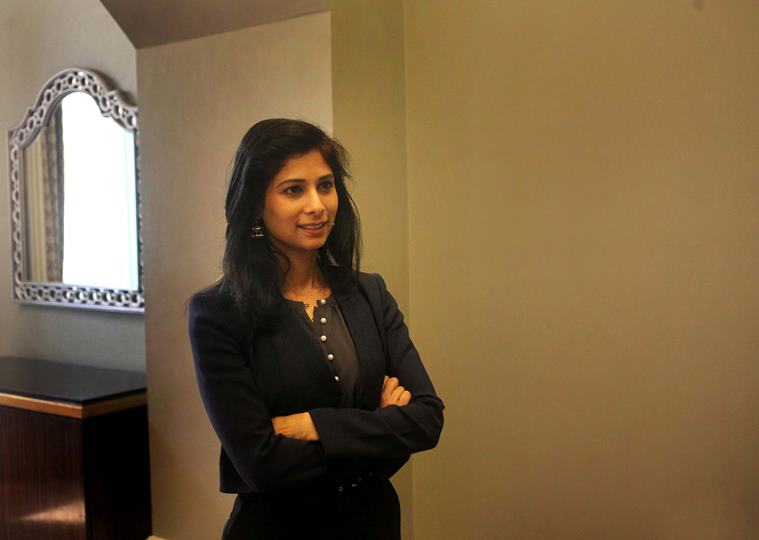Can new IMF chief economist Gita Gopinath make the global moneylender less exploitative?
Gita Gopinanth’s technical skills may be useful to furtherance of capital markets and macro economic policies, but they don’t seem to be of value to real life economics in countries like India

Prof. Gita Gopinath is given an interview at Hotel Taj Mahal Palace in Mumbai. She is a professor at the economics department of Harvard University and the Financial advisor to the Chief Minister of Kerala. (Express Photo By Pradip Das)
India-born American economist Gita Gopinath’s appointment as the chief economist of the International Monetary Fund (IMF) may be a major boost for brand India and a new benchmark for the level of excellence Indian women can achieve internationally; but beyond that how much does it matter for her home country and the developing world?
As IMF Managing Director Christine Lagarde’s statement appointing Gita reiterated, it’s indeed an endorsement of her brilliant academic credentials as a well-known global economist. “Gita is one of the world’s outstanding economists, with impeccable academic credentials, a proven track record of intellectual leadership, and extensive international experience,” Lagarde said. Clearly, yet another validation for somebody who has always been an outstanding achiever in academics and research and has been on panels, boards, think-tanks and committees of prestigious institutions.
It’s certainly remarkable that Gita is also the first woman, and only the second Indian, to be the chief economist of IMF. A few years ago, she made headlines when she became the third woman to be a tenured full professor at Harvard. She is a highly regarded scholar of economics and also a well-known author and analyst.
However, the excitement ends there. It’s the personal and professional achievement of a career economist from a third world country, but not the prospect of her excellence or knowledge helping the world she originally belonged that makes the headlines.
IMF, along with its twin World Bank, are money bags that are driving the world towards a global economic order in service of the Western capitalists. IMF is primarily a financier for debt-ridden countries (or countries that have run out of money), that leverages the latter’s helplessness to further globalisation and “austerity”. As Nobel laureate and former chief economist of the World Bank Joseph Stiglitz had time and again alleged, its conditional loans and policy advices had wrecked economies across the world even as it continued to be overconfident about policies that didn’t work.
Can anybody heading the research unit of such an organisation that is accused of precipitating the 1990s currency crisis in Asia, because of Wall Street motivated conditional loans, and the subsequent blunder of prescribing fiscal austerity to the countries that suffered because of its tied assistance, make a difference to the economies and lives of the developing world? How useful is an organisation that’s accused of “market fundamentalism” and prefers markets to governments, even in delivering welfare, to the people of the world that Gita originally belonged to? In Stiglitz’s book, Gita will be one of the “third-rate economists from first-rate universities” — that’s what he called the IMF economists.
As the chief economist, will Gita have a role in policy advice? If it all she does, will it change the way IMF operates?
Highly unlikely, because unlike the World Bank, which constantly changes its goal posts, IMF is still quite orthodox in its policy prescriptions – paving the way for markets, encouraging austerity, promoting capital account liberalisation, and cutting down on welfare in the name of fiscal discipline. It’s a cut-throat and exploitative lender to those in distress.
Over the years, the World Bank has acquired some heart and has softened its stance on welfare, social protection and issues such as universalisation of access to health. Apparently, World Bank is open to debates, while the IMF is quite secretive and stubborn although it claims otherwise citing examples such as Sri Lanka, where it reportedly had advised against capital account liberalisation.
Given that historically IMF has gotten it wrong on many occasions, that its policy prescriptions have landed countries in trouble (e.g East Asia, Korea, Argentina) and that it mostly sticks to its market conservatism, there is certainly space to be cynical of Gita’s credentials as a researcher. If it’s to follow a beaten track, often justified as battlefield medicine because there isn’t much time for debates in the middle of a crisis, what’s the need for high end research. Is it to retrofit an already set policy prescription?
Although the IMF honchos counter critics such as Stglitiz as good in theory, but poor (or rather a latecomer) in policy, Gopinath is not widely known for any major policy intervention other than her body of work in trade, currencies and other aspects of global capitalism.
Her technical skills may be useful to the furtherance of capital markets and macro economic policies to help transnational capitalism, they don’t seem to be of any value to real life economics of countries such as India. For instance, nobody knows what her contribution has been as an advisor to the Chief Minister of Kerala – the only reported policy advice she has provided to any country. The two areas she may have advised Kerala on, according to media reports, were health and skill development. In health, the state is pursuing a perilous model of insurance and, in skill development, there’s hardly anything new.
When Stiglitz launched a tirade against the IMF in 2002, its then chief economist Kenneth Rogoff accused him of peddling “snake oil”. It will be interesting to see if an otherwise reticent Gita will get as colourful as Rogoff was in defending her new workplace. In reality, the “economics” that both the IMF and the less virulent World Bank use to further their vested interests are as dicey as snake oil. You don’t need new research to sell a half-a-cenutry old product, which is nothing but money with a string of exploitative conditions.
For all the latest Opinion News, download Indian Express App
More From G Pramod Kumar
- Month after flood, is Kerala struggling with reconstruction, raising money?Kerala floods: After the initial success in rescue and relief in which civil society played a critical role, the government doesn’t seem to have gained…
- To recover, Kerala needs to follow the ‘Build Back Better’ policy and become more accountableThe state stands to lose a historical opportunity to rejig its development agenda, and protect is people and assets after the devastating floods...
- Kerala can convert the damage caused by floods into an opportunityUnless it turns things around quickly, Kerala is likely to lose its hard-earned development gains in no time. However, it requires enormous human, financial and…

 Gita Gopinath has done work on price setting across currencies and the sovereign debt defaults in Europe. (Express Photo By Pradip Das)
Gita Gopinath has done work on price setting across currencies and the sovereign debt defaults in Europe. (Express Photo By Pradip Das)





































No hay comentarios:
Publicar un comentario